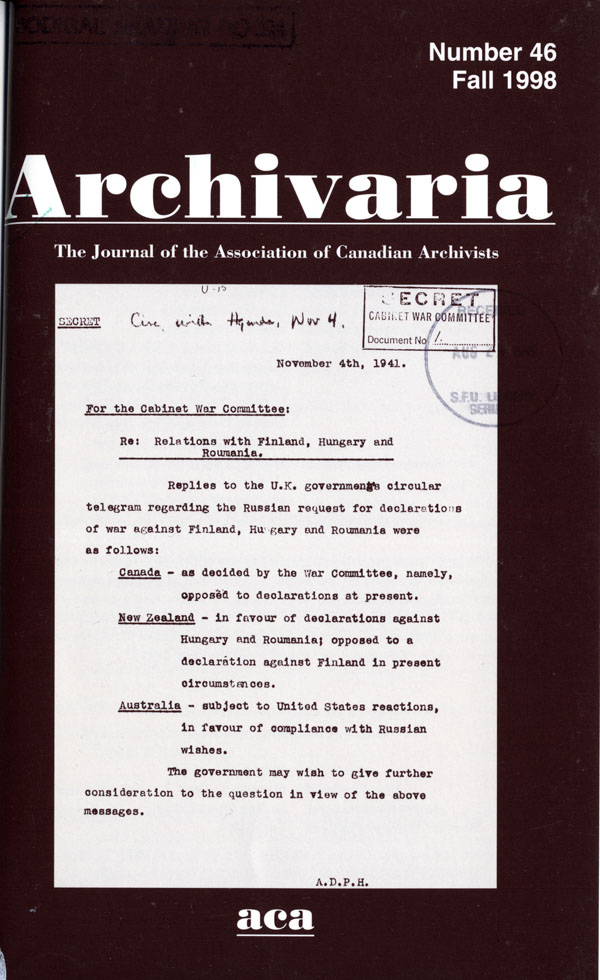The Great War, Archives and Modern Memory
Abstract
A debate has emerged within the archival community: is the archivist a creator of our memory of the past, or merely a helper to the actual creators? One school of thought defines the archivist as the “guardian” of the record, whose role is to preserve it and make it available to others, the creators of our knowledge of the past. An alternative school defines the archivist as an autonomous creator, as the author of the archival record. From this perspective, archivists play a critical role in the creation of society's memory, and, its logical obverse, in creating silences – gaps in our knowledgeof the past – across the spectrum of our professional work. This article examines this debate in a narrow context, the Canadian military record of the First World War, by presenting, first, a narrative of the history of this record and the two contemporary archival strategies employed to document the war. Second, very briefly, it considers how subsequent archivists have made judgements of value respecting these records by giving them an “archival profile.” Third, by way of a conclusion, it offers observations about the archivist as author, as a creator of memory. This paper is a response to Terry Cook’s call for the examination by archivists of “our own politics of memory” – an exploration of what is remembered and what forgotten, as reflected across all archival functions.
RÉSUMÉ
Un débat a fait surface au sein de la communauté archivistique à savoir sil’archiviste est le créateur de la mémoire du passé ou simplement un agent au service des créateurs. Une école de pensée voit l’archiviste comme le « gardien » des documents dont le rôle est de les préserver et de les rendre accessibles à d’autres, ces derniers devenant ainsi ceux qui forgent notre connaissance du passé. Une école alternative définit l’archiviste comme créateur autonome à titre d’auteur des documents d’archives. Dans cette perspective, les archivistes jouent un rôle crucial dans la création de la mémoire d’une société et de ses différentes facettes en créant des silences – ces trous dans notre connaissance du passé – par le biais d’une diversité d’interventions professionnelles. En premier lieu, l’article examine ce débat à l’aide du cas restreint des archives militaires canadiennes de la Première Guerre mondiale. On présente d’abord un récit de la constitution de ces archives et des deux stratégies contemporaines à la Guerre destinées à documenter le conflit. En deuxième lieu, et brièvement, on considère comment les archivistes qui se sont succédé depuis ont porté des jugements de valeur sur ces documents tout en les respectant et en leur offrant une « visibilité archivistique. » Troisièmement, et en guise de conclusion, on propose des observations sur l’archiviste comme auteur ou créateur de la mémoire. L’article répondà la proposition faite par Terry Cook pour que les archivistes examinent eux-mêmes leurs politiques de la mémoire – une exploration de ce dont on se souviendra et de cequi sera relégué aux oubliettes, ce à quoi concourent toutes les fonctions archivistiques.
Authors of manuscripts accepted for publication retain copyright in their work. They are required to sign the Agreement on Authors' Rights and Responsibilities that permits Archivaria to publish and disseminate the work in print and electronically. In the same agreement, authors are required to confirm that "the material submitted for publication in Archivaria, both in its paper and electronic versions, including reproductions of other works (e.g. photographs, maps, etc.) does not infringe upon any existing copyright." Authors of manuscripts accepted for publication retain copyright in their work and are able to publish their articles in institutional repositories or elsewhere as long as the piece is posted after its original appearance on archivaria.ca. Any reproduction within one year following the date of this agreement requires the permission of the General Editor.





